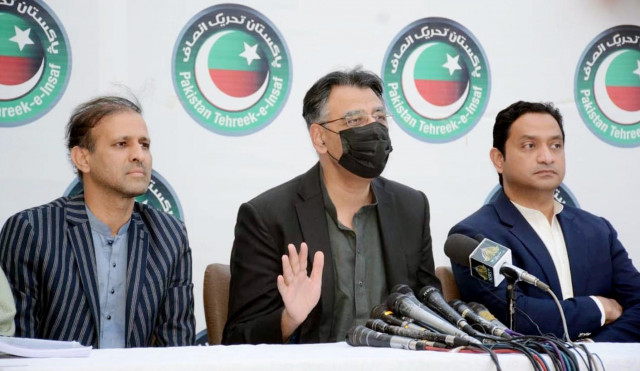Sindh’s amended LG law ‘endangers’ country: Umar
Minister says Centre will initiate legal action against provincial govt for Rs20b ‘wheat theft’

Federal Planning and Development Minister Asad Umar on Sunday maintained that the Sindh government with its recent amendments to the local government law was putting the country “in danger”.
The minister, while addressing the media in Karachi, lashed out at the provincial government for trying to “disempower the local bodies”.
LIVE #APPNews : Federal Minister for Planning @Asad_Umar addressing news conference #Karachi. https://t.co/NsOWjQIRD7
— APP 🇵🇰 (@appcsocialmedia) January 2, 2022
“The Sindh government’s new amendments will further erode the autonomy granted to the local bodies in light of the Constitution,” he added. The recent amendments to the Sindh Local Government Act are under severe criticism from the political stakeholders of Karachi as well as the civic experts. The amended local government bill was passed by the provincial assembly in November last year amid strong by the opposition parties, which raised their reservations over what they termed the reduction in power of the elected representatives under the new law.
Sindh Governor Imran Ismail had also returned the bill to the provincial assembly with 10 objections.
However, last month, the provincial assembly had passed the contentious Sindh Local Government (Amendment) Bill 2021 again, with a few amendments to the original draft. The minister maintained that there was a need to devolve power to a local level in a diverse country like Pakistan to prevent discord and instability.
Umar said for the sake of democracy and Pakistan’s security, autonomous local bodies were mandatory in the light of the Constitution. “The amendments are unconstitutional and the ruling party will file a petition against them.” He said the 18th Amendment had granted more powers to the federating units, which was a “good thing”. However, he added that there were some clauses in the amendment that could be reviewed for the sake of coordination. The minister further said the Centre would initiate legal action against the Sindh government over the “theft” of wheat worth Rs20 billion in the province.
He claimed that the price of a 20kg bag of wheat flour in Sindh was Rs300-350 – even higher than that in Punjab even though the former was the largest producer of the crop in the country. “According to NAB [National Accountability Bureau], wheat worth Rs20 billion was stolen in Sindh whereas the provincial government had said that the crop was spoiled by rats,” he added. He said the issue would be raised in both the National and Sindh assemblies, as an explanation was necessary.
He pointed out that PPP Chairman Bilawal Bhutto Zardari's sister had earlier claimed that the province was barred from buying vaccines under law. "What law prevents the Sindh government from buying vaccines for its citizens?" Umar asked. "If there is such a law, let us know and we will change it.”
In response to a question, the minister replied that the supplementary finance bill (“mini-budget”) tabled in the National Assembly was prepared as per the demands of the International Monetary Fund (IMF) after intense negotiations between the government and the Washington-based lender..
Read: Sindh reverses decision on LG bill
He added that the finance ministry had convinced the IMF to reduce the revenue target from over Rs700 billion to about Rs350 billion. Umar claimed that out of the Rs350 billion, at least Rs262 billion taxes would be refunded or adjusted. Whereas, he added, the public would be burdened with taxes worth only Rs2 billion, which was not "much". Speaking about the coronavirus vaccination campaign, Umar said that the government managed to meet its target to inoculate 70 million people in the country by the end of this year.
The minister added that Rs250 billion were allocated by the federal government for a countrywide vaccination campaign that did not discriminate against anyone during the inoculation drive.
He also urged the people to take precautions amid a rise in Omicron cases across the country.
Reacting to Umar's news conference, Sindh Information Minister Saeed Ghani said it was a PPP minister who had first noted that wheat theft had occurred.
"It was the Sindh government that wrote to NAB asking to investigate," he added. The provincial minister added that the Sindh government had “caught all the rats involved in the wheat theft”. He added that “one rat ate up“Rs40 billion from the coronavirus fund” and also “stole Rs600 billion of the nation's wealth during the purchase of LNG”. “Other rats caused a sugar and wheat shortage in the country.”
(With input from agencies)



















COMMENTS
Comments are moderated and generally will be posted if they are on-topic and not abusive.
For more information, please see our Comments FAQ